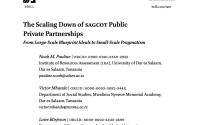Eco-Innovations in Agriculture: How Sustainable Mechanization is Reshaping Agriculture
By Charles Muchoki
In the dynamic arena of modern agriculture, the integration of sustainable mechanization strategies is emerging as a transformative force, redefining the contours of traditional farming practices. This shift toward a more technology-driven, environmentally conscious approach is not just a matter of advancement; it is a necessity, driven by the imperative to meet the escalating demands of a burgeoning global population while preserving the delicate balance of our natural ecosystems. The United Nations Food and Agriculture Organization’s Regional Office for Africa has underscored the transformative potential of sustainable agricultural mechanization, delineating its capacity to revolutionize rural livelihoods and agrifood systems worldwide.
Catalyzing Productivity While Easing Labor
The most conspicuous benefit of sustainable agriculture mechanization lies in its remarkable impact on productivity. The advent of modern, precision-based machinery has revolutionized farming operations, encompassing everything from planting to harvesting and processing. This technological leap has not only spurred a significant uptick in output but has also played a pivotal role in diminishing the reliance on labor-intensive practices. The alleviation of physical labor, a perennial challenge in traditional farming, has rendered agriculture a more attractive and sustainable occupation, opening new vistas for prospective farmers.
Optimizing Resource Utilization
Another cornerstone of sustainable mechanization is its emphasis on precision farming. This approach champions the judicious use of natural resources, including water, fertilizers, and pesticides, ensuring that every input is optimally utilized. By tailoring these inputs to meet the specific requirements of each crop, farmers can minimize waste and mitigate the environmental footprint of their activities. This resource-efficient paradigm not only bolsters farm profitability but also plays a crucial role in safeguarding ecosystems and preserving biodiversity.
Minimizing Food Loss and Waste
A significant, yet often overlooked, advantage of sustainable mechanization is its role in curtailing post-harvest losses and food waste. Advanced storage and transportation capabilities, integral to modern agricultural machinery, ensure that harvested produce is preserved and delivered to markets in prime condition. This not only safeguards the economic interests of farmers by maintaining the value of their yield but also contributes significantly to global efforts aimed at bolstering food security.
Attracting the Youth to Agriculture
In an era where the agricultural sector often struggles to appeal to younger generations, sustainable mechanization offers a beacon of hope. By infusing agriculture with cutting-edge technology and innovative practices, this approach rebrands farming as a dynamic, technologically advanced field. This repositioning is critical in attracting youthful talent to agriculture, ensuring the infusion of new ideas and sustaining the industry’s growth and evolution.
Mitigating Climate Change
Sustainable agriculture mechanization dovetails seamlessly with climate-smart practices, positioning itself as a potent tool in the global battle against climate change. Techniques such as precision farming, crop rotation, and a reduced dependency on chemical inputs contribute significantly to lowering greenhouse gas emissions and enhancing carbon sequestration. In doing so, sustainable mechanization not only fortifies agriculture against the impacts of climate change but also elevates it as a key player in worldwide climate mitigation initiatives.
Hope in a Complex World
As the world grapples with the intricate challenges posed by an increasing population, the imperative of environmental sustainability, and shifting demographic patterns, the role of sustainable agriculture mechanization becomes increasingly paramount. This harmonious blend of technology and traditional farming methodologies addresses immediate and long-term concerns, paving the way for a resilient, efficient, and sustainable future in agriculture. The journey towards a greener, more productive agricultural sector is not just a vision; it is a reality in motion, propelled by the innovative spirit of sustainable mechanization.
The multifaceted benefits of sustainable agriculture mechanization are not just a panacea for the myriad challenges faced by the agricultural sector; they represent a paradigm shift towards a more sustainable, equitable, and prosperous future. The integration of these practices is not just a choice but an imperative, a critical step towards ensuring food security, environmental sustainability, and socio-economic development for generations to come. As we continue to advance on this journey, it is crucial to foster an environment conducive to innovation, collaboration, and sustainable growth, underpinning the very essence of our collective quest for harvesting success.


